Dear Readers,
this newsletter gives you an overview of current course and consulting offers concerning digital topics in research and informs you about current developments in the field of research data and research software management.
You can read about who we are in “What is zedif?”. Take special note of the Digital Research Clinics, an offer to get fast and one-on-one in-presence help with your problems. To expand your skills in the use of digital tools and topics related to research data management read about our practical courses. In addition, the Data Literacy Jena (DaLiJe) project offers various courses for interested students. DaLiJe is more than that though, e.g., it recently organised a very successful Datathon with the topic “Datenwerkstatt Jena 2024”.
June will be the month of the Thuringian Research Data Management Days, a state-wide online block event about data competencies and artificial intelligence. The Coffee Lectures and the monthly Stammtisch Forschungsdatenmanagement invite you to have a short exchange. The application period for the FAIRest Dataset Award 2024 is currently open. Maybe your data set will win? However, if you still need support in creating FAIR data, you can also contact the Thuringia-wide data stewards of the Thuringian Competence Network for Research Data Management.
We have also summarized current information from various NFDI (National Research Data Infrastructure) consortia for you. If you think sharing research infrastructure within Jena is a good idea, read on about JenaVersum and OpenIris and if you are interested in the progress of artificial intelligence, please join the newly established KI-Forum. Finally, Prof. Vilotijević reports in an interview on challenges and advantages of using an electronic lab notebook in his team.
Enjoy reading, educating and networking!
Your zedif team
Information
zedif — What we do
zedif is short for “Competence Center Digital Research“. We provide open doors and helping hands for all digital concerns of researchers.
We are the main point of contact for researchers and scientists from the University of Jena and other members of the Michael Stifel Center Jena, who are looking for help with any digital issues they may face during their research.
We provide assistants on the topics of teaching and training, funding requests, as well as with information on how to implement or develop digital tools. We are looking forward to every request, be it small, quickly answerable phone calls or year-long cooperations. If you are unsure on who to contact with your issues, we will help you find the correct contact person and provide additional consultations where needed.
Get in contact:
- Servicedesk: https://serviceportal.uni-jena.de/zedif
- Matrix Chat: https://matrix.uni-jena.de/#/room/#zedif-consultation:uni-jena.de
- E-Mail: zedif@uni-jena.de or researchdata@uni-jena.de
- Telephone: +49 3641 9-46435 or 9-46340
You can find us at the 21st floor of the JenTower. Please make an appointment beforehand so the best suited consultant will be available for you.
[up]Announcement
Digital Research Clinic
You can contact zedif at any time, but we have set aside special days we call “digital research clinic” to provide an even lower-barrier opportunity to meet with us. There, we will assist you with digital issues you have encountered in your projects — from short scripts to extensive applications, from small datasets to large databases.
Despite walk-ins being welcome, we invite you to register in the qualification portal, as this gives us the opportunity to prepare for your specific question. You can find the dates of the upcoming clinics (usually the first Thursday each month) in the qualification portal. The next “digital research clinic” takes place on 11 April 2024, 9 am to 4 pm.
[up]Announcement
Practical courses for the summer semester 2024
In the summer semester 2024, the zedif once again offers numerous courses that teach basic knowledge and skills in digital tools, research data management and programming. There are also courses on using an HPC cluster and tools to help scientific writing. A special offer is the Carpentries’ software related certificate course.
Would you like a course on a topic that we do not offer yet? Feel free to send us a short (or long) email to zedif@uni-jena.de with the subject: course wish: topic.
This semester we are offering the following courses:
Research Data Management
- Research Data Management Plans - more than a formality!
- Research Data Management — Make your data count! (as part of the qualification programme of the graduate academy)
Data processing and analysis
- Introduction to the Command Line
- Basic Version Control with Git: A Beginner’s Workshop
- Advanced Use of the Command Line Bash
- Collaborative Version Control with Git: An Advanced Workshop
- Version Control and Project Management with GitLab
- First Hands-on Experience on a HPC Cluster
- HPC Cluster Usage for Advanced Users
- Introduction to the Database Query Language SQL
- Introduction to Programming with Python in March
- Introduction to Programming with Python
- Scientific computing with Python and NumPy
- Introduction to Julia for Programmers
- A brief Introduction to R
Publication and Presentation
Carpentries Certificate Courses
The Carpentries are an internationally active , non-profit organisation. Their aim is to to make basic data and software skills accessible to increase efficiency, openness and reproducibility in science and research. The Carpentries consist of three flavours with different focuses: Data Carpentry, Library Carpentry and Software Carpentry. We offer the following course in the summer semester:
- Software Carpentry Workshop (Unix Shell, Git, Python)
By participating, you can acquire an internationally recognised Carpentries certificate.
All details about the courses and registration can be found in our catalogue within the Qualification Portal. The courses are open for all members and students of scientific institutes in Jena. The course language is generally English.
If you have any ideas or wishes for further courses, feel free to contact us.
[up]Announcement
Data Competencies for Students: Offers by the Data Literacy Project
Due to the increasing digitalisation and datafication of our living and working environment, competent and critical handling of data is an important qualification for university graduates. The university’s Data Literacy Project is therefore once again organising various courses for interested students in the summer semester. The topics range from the general basics of data handling and use of digital tools to ethical, legal and social issues.
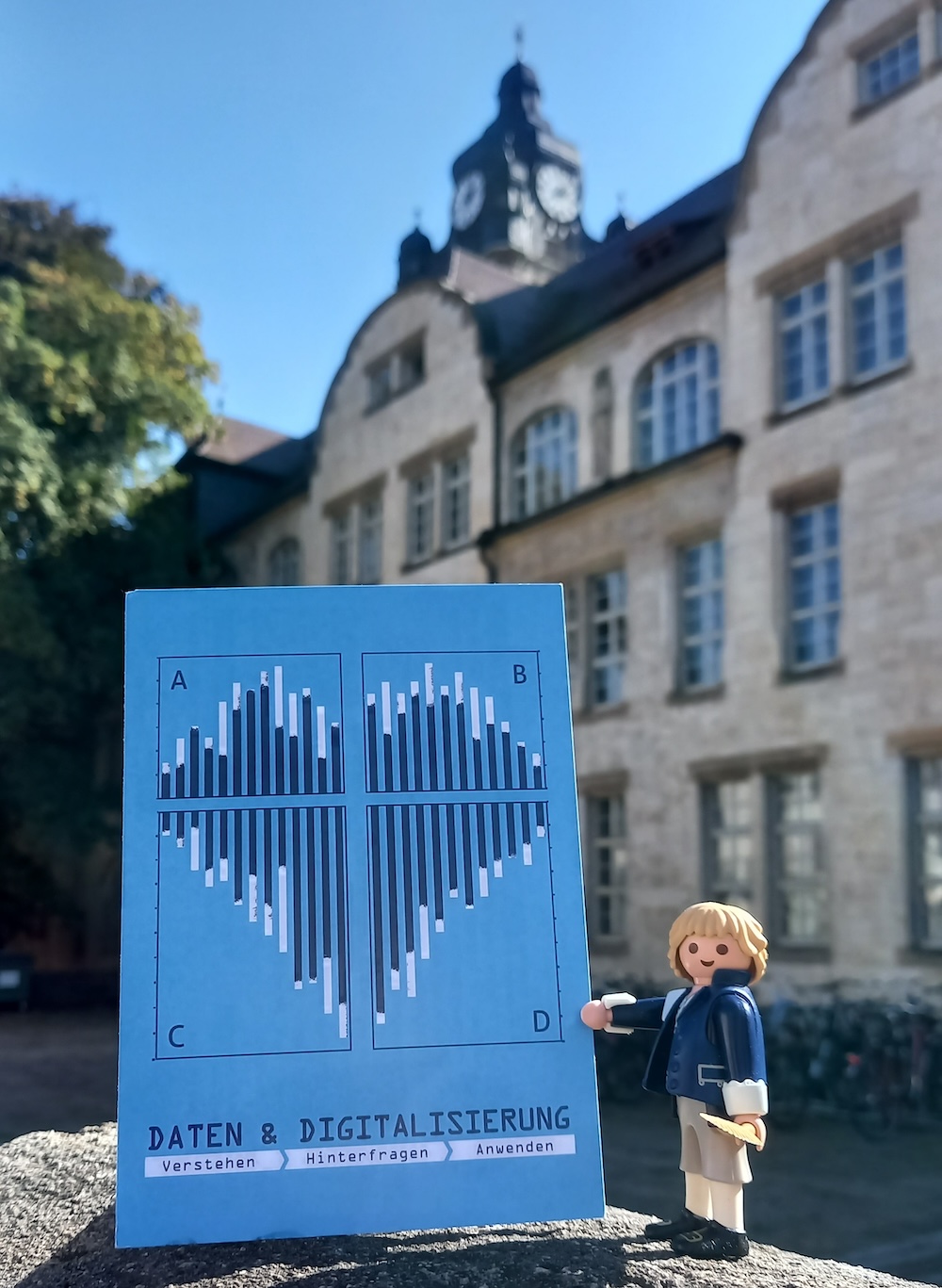
Depending on interest and time availability, flexible formats are available, e.g. 90-minute hands-on sessions, workshops and the multi-level certificate program Data Literacy Jena (DaLiJe). In the coming semester, the hands-on sessions will focus, for example, on tools for working effectively with data (R, OpenRefine, visualisation tools), questions of data ethics and the trustworthiness of statistics and artificial intelligence. The courses can be used free of charge by students from all study programs and semesters. No special prior knowledge is required.
On April 8th, 2024 at 4 pm there will be an information event on the topic of data literacy and the offers of the Data Literacy Project at the University of Jena. All interested parties are welcome.
Further information on the offers can be found on the project website and via the data literacy mailing list.
The project is always looking for partners in the faculties at the University of Jena and is happy to support lecturers in (further) development of (new) courses related to data and digitisation (e.g. digital tools, data management, social/legal issues).
If you have any questions about the courses or are interested in working with us, please contact the Data Literacy Team: dataliteracy@uni-jena.de.
[up]Information
Impressions from the first Data Literacy Datathon at the University of Jena
From March 5th to 7th, the first Data Literacy Datathon titled “Datenwerkstatt Jena 2024” took place at the University of Jena. The event was organised by the Data Literacy Jena project in collaboration with partners from Jena. More than 20 participating students worked in interdisciplinary teams on 5 challenging projects proposed by the University of Jena, the Thüringer Universitäts- und Landesbibliothek (ThULB), and the Smart City project of the city of Jena. They were supported by mentors who assisted with methodological and technical questions.
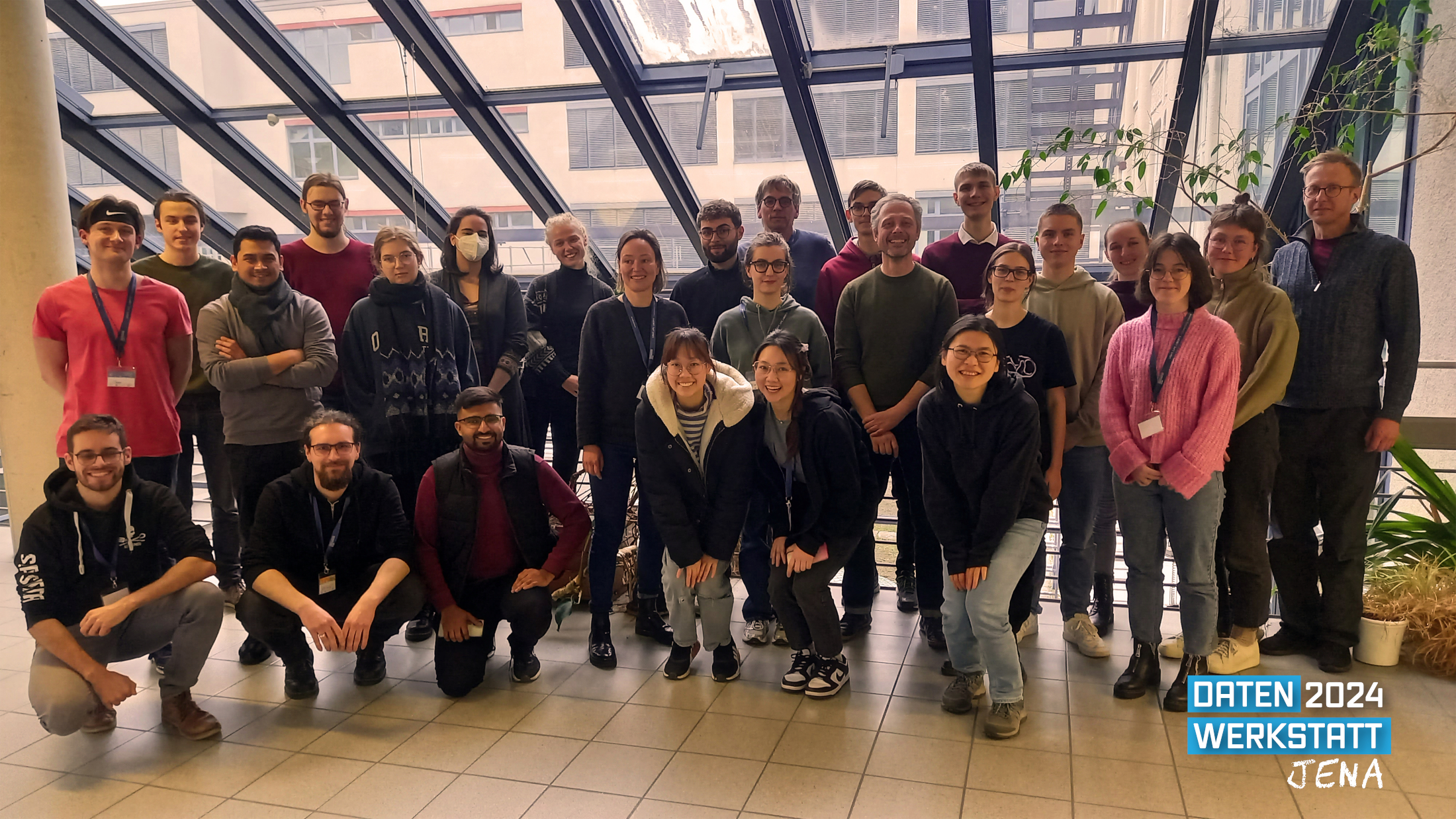
The Datathon resulted in diverse and innovative solutions. Within the projects, for example, new approaches were developed to enhance the attractiveness of the university, to visualise data for internal and external communication regarding the students at the University of Jena, as well as to create starting points for workflows concerning cultural heritage and historical buildings. Additionally, new elements for a platform related to childcare in the city of Jena were built.
The organisers were delighted with the outcomes and the positive feedback from both the challenge providers and participants. The Data Literacy Datathon is intended to be held as a regular event in the future. Further details about the event and the challenges can be found on the event page.
[up]Announcement
Save the Date! Thuringian Research Data Management Days from June 18th to 19th!
The Thuringian Competence Network for Research Data Management (TKFDM) is hosting the Thuringian Research Data Management (RDM) Days from June 18th to 19th for the sixth time. The free online conference targets all researchers in Thuringia.
This years motto is: “Becoming literate in the Data Universe — From data literacy to the application of AI”. The conference will begin with a short introduction on RDM followed by presentations from the DataSteward project of Thuringia and the planned RDM repository for Thuringia. The second day of the conference will be filled with interesting sessions on the topics of data literacy, artificial intelligence, and ethics on handling data and the usage of AI in RDM.
You will find more information, a detailed agenda and the registration here asap. If you do not want to miss TKFDM events in the future, subscribe to the TKFDM mailing list.
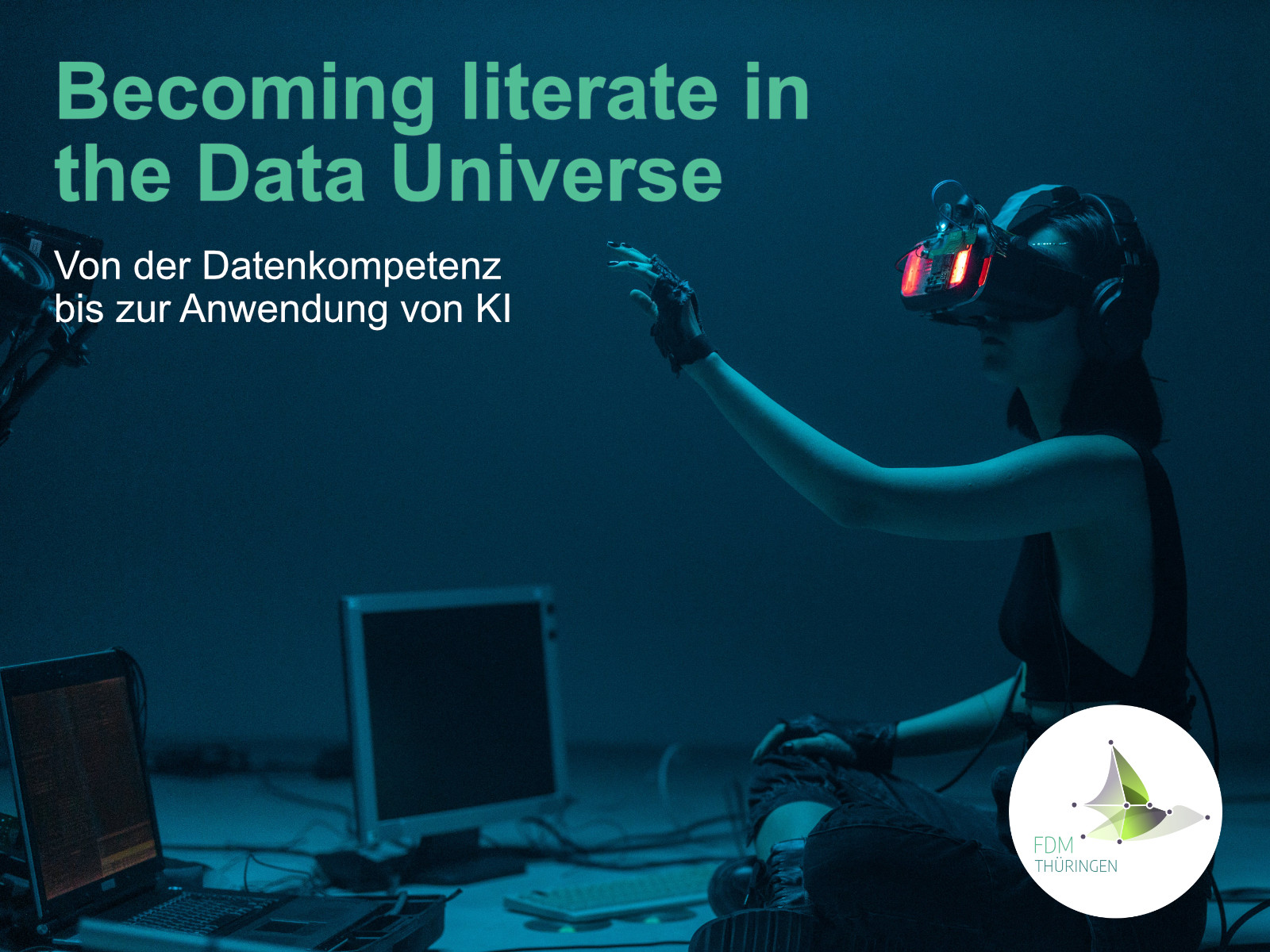
Announcement
Research Data Management Coffee Lectures
The Thuringian Competence Network for Research Data Management (TKFDM) will continue with the well received online Coffee Lecture series in April 2024.
Once a month on a Wednesday from 2:00 to 2:30 p.m. you can attend one of these short lectures online via Zoom. This semester’s Coffee Lecture series is dedicated to the topics of metadata, ontologies and terminologies, showcasing which services are available and how they can be used for research data management.
Just grab a cup of coffee or tea and enjoy. You will find more information on the topics and registration on the TKFDM Coffee Lecture Homepage.
The TKFDM offers permanent access to all Coffee Lecture materials of the past years. Recordings of all events are available on the TKFDM’s YouTube channel, while the presentations’ slides can be found on zendo.
[up]Announcement
Regulars’ Table “Research Data Management” in Jena
Once a month, research data managers and interested people meet for the ‘Jenaer RDM Regulars’ Table’. At this informal get-together you will have the opportunity for a collegial exchange on a variety of RDM-related topics, including
- the implementation of data management in everyday research,
- experiences with the introduction and use of electronic lab notebooks (ELN), and
- information on RDM services and events organised by zedif and the Thuringian Competence Network for Research Data Management (TKFDM).
The target group of the regulars’ table consists of researchers who work in RDM, data stewards, research coordinators who have had contact to RDM, and people who work in research infrastructures in general. The regulars’ table’s meetings alternate from Wednesday or Friday for lunch or dinner respectively. The next regulars’ table will take place on March 22 at lunchtime as a hybrid event. After an experience report on the introduction of the electronic lab notebook RSpace at Leibniz:HKI, a joint lunch with the participants is planned. If you would like to take part in this event or be informed about future activities, please subscribe to the mailing list.
If you have further questions regarding the RDM Regulars’ Table, please contact Cora Assmann at cora.assmann@uni-jena.de.
[up]Announcement
TKFDM announces 5th FAIRest Dataset award
WANTED: FAIRest Dataset in Thuringia. Did you ever publish a dataset that followed the FAIR-Data-Principles? Then take part in the FAIRest Dataset competition!
The Thuringian Competence Network for Research Data Management (TKFDM) awards the dataset that best implements the FAIR Principles with a prize money of up to 2,000 €.
Submit your published datasets until April 15! Eligible are all researchers who are working at a Thuringian university at time of participation.
Further information on the competition and the conditions of participation can be found on the TKFDM’s Website.
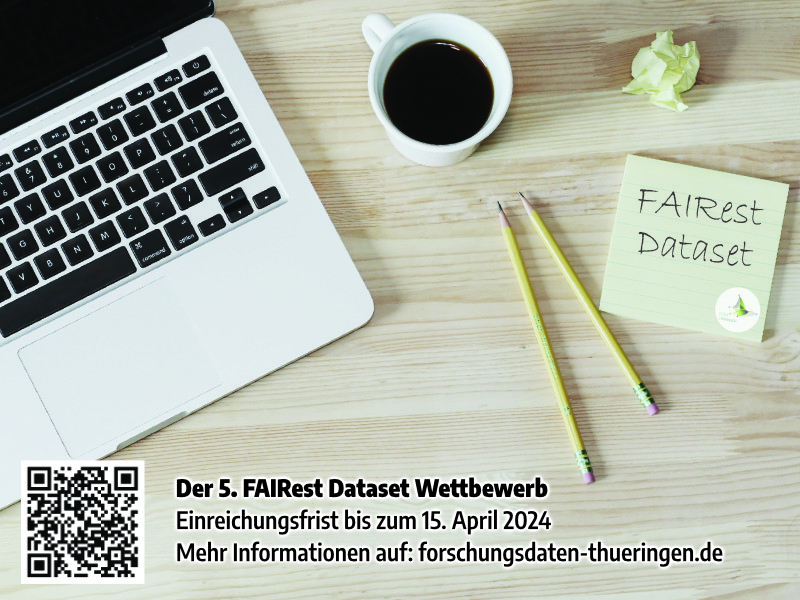
Announcement
“Rent a Data Steward” pilot project
The data steward pilot project in Thuringia was launched at the end of 2023. Since the beginning of November, two data stewards have been working at the Jena and Ilmenau campuses to expand the existing advisory services offered by the RDM helpdesks at Thuringian universities. While the helpsdesks mainly take on an advisory role, for example in the creation of data management plans, the data stewards also design and implement concrete solutions in the field of research data management. They work closely with the universities’ service and infrastructure providers. Further information about the project and the possibility of booking a data steward for your working group can be found on the website of the Thuringian Competence Network for Research Data Management (TKFDM).
[up]Announcement
NFDI News
The NFDI aims to make research data accessible and usable in the long term. Services, standards and training opportunities for researchers are developed and made available in discipline-specific and cross-topic consortia. The NFDI provides trans-disciplinary offers on RDM, new services and digital tools, e.g., with the monthly newsletter and the NFDITalks Here, we focus on the latest activities of NFDI4Culture, MARDI, KonsortSWD, NFDI4Health, NFDI4Biodiversity and BERD@NFDI.
NFDI4Culture presents Use Cases highlighting RDM application examples and success stories from the domain of tangible and intangible cultural assets.
Are you interested to learn more about RDM in mathematics in a playful environment? Then you should definitely try out MaRDI’s (Mathematical Research Data Initiative) Decision Tree “What type of mathematician are you?” as well as the game “Data Quest”. Here, you will also learn about which of your research materials are considered data and find more tips and tricks on how to create a Data Management Plan.
KonsortSWD recently created QualidataNet: a “single point of entry“ to search for information regarding qualitative research data in social, educational, behaviour and economic science, as well as general RDM.
The NFDI4Health invites you to their second User-Survey! Until April 7 2024 you will be able to share requirements, needs and wishes you have for the consortium, for them to better adapt their services for the community.
The NFDI4Biodiversity provides several tools and services to facilitate research data management, data visualization, experiment planning and many more. Starting on April 4, 2024 with the terminology service, these tools will be introduced in a webinar series.
BERD@NFDI provides an Optical Character Recognition Service (OCR-Recommender), a service that generates individual instructions to increase picture quality and data extraction from answers you give to specific questions.
[up]Announcement
JenaVersum und OpenIRIS - Administration and booking of devices and services
The association JenaVersum, founded in 2021, acts as a science and business network to facilitate cooperation and collaboration in Jena. JenaVersum explicitly aims at integrating and optimising the coordinated use of research infrastructures within the network.
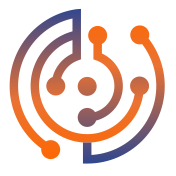 A first step is the implementation of the web-based open source platform OpenIRIS, which improves the visibility of large-scale equipment and devices.
In the current pilot phase, various interested parties in Jena are already familiarising themselves with the platform, including the University of Jena and Jena University Hospital.
Going forward, OpenIRIS will increase the accessibility for JenaVersum members to find and book equipment and services.
If you are interested in participating in the current pilot phase or have general questions, please contact openiris@jenaversum.de.
A first step is the implementation of the web-based open source platform OpenIRIS, which improves the visibility of large-scale equipment and devices.
In the current pilot phase, various interested parties in Jena are already familiarising themselves with the platform, including the University of Jena and Jena University Hospital.
Going forward, OpenIRIS will increase the accessibility for JenaVersum members to find and book equipment and services.
If you are interested in participating in the current pilot phase or have general questions, please contact openiris@jenaversum.de.
Information
University-wide mailing list facilitating exchange regarding AI topics
The office of the Vice President for Digitalisation has set up a mailing list as a lively forum for everyone at the University of Jena who is interested in Artificial Intelligence (AI).
The “ki-forum” list serves as information exchange as well as a platform for discussions. It provides information on events, courses and other offers regarding AI, the capabilities and limitations of generative AI, the use of AI tools in research and teaching, dealing with AI at the University of Jena and much more. You can address your own topics, share information and draw attention to offers on AI. Whether you are new to the topic or doing research with or on AI yourself, everyone is welcome.
You can join the mailing list via its information page.
[up]Interview
Interview with Prof. Ivan Vilotijević (IOMC) on Electronic Lab Notebooks
Ivan Vilotijević is Professor of Synthetic Organic Chemistry at the Institute of Organic Chemistry and Macromolecular Chemistry at Friedrich Schiller University Jena. Together with his team, he is focussing on the discovery, development, and application of new reactions for synthesis of complex organic molecules. In this interview, he talks about the advantages of using an electronic lab notebook and his experience of introducing it in his research lab.
Why did you decide to implement an Electronic Lab Notebook (ELN) in your research group?
A few things that an ELN allows us to do easily were important for my research team: data safety and the ease of backing up data in a digital form, the searchability and findability of data, the ease of sharing data with other members of the research team and the ease of organizing data in one place.
What advantages do you see in using an ELN compared to a paper-based lab notebook?
There are many advantages. For example, an ELN is easier to backup. Prior to using the ELN, data in electronic form were saved and backup up regularly but the experimental procedures and notes were entered into a paper-based notebook which would have to be scanned (or copied) to produce a backup. With the ELN this process is automated. Furthermore, the ELN allows for data to be better organized and easily accessible. Various useful tools are integrated into the ELN both with respect to experiment set up and data processing which saves time. The data can also be saved at various stages of processing. I struggle to find any true advantage of a paper-based notebook.
Do you have a specific example where the ELN has facilitated your work?
In addition to the advantages, I already mentioned, from which we have greatly benefited, the ELN also makes it easier for my coworkers to prepare reports and presentations.
Which ELN do you use?
We were early adopters of Chemotion ELN and started using it in 2021.
Is the use of the ELN mandatory in your research group?
In short, yes. All active members of the research group use the ELN. Research interns do still use regular paper-based notebooks as I find this experience important for their learning but as they become more integrated into the group and our research projects, they start using the ELN.
How long did it take to familiarize yourself and the group with the ELN?
As early adopter of Chemotion, we had a slightly longer period of adaptation during which a couple of group members tested the ELN. As they became familiar with all features and established standards of use for our group, other members got involved and were trained by those who already gained experience with the ELN.
What challenges do you see in implementing an ELN and what must be considered at the beginning?
Technical equipment in the lab is certainly a prerequisite to use the ELN. Researchers should carefully consider what equipment works best for their needs (for example, a computer vs. a tablet) before establishing the necessary infrastructure. Having a person responsible for the ELN, training of new group members and troubleshooting of any issues (with the help of the developers) makes the implementation much easier.
Why did you choose Chemotion ELN?
It was a simple choice. Chemotion is developed for chemists by chemists, and it fits our needs perfectly. We also had an opportunity to provide feedback and influence the development of features that are useful for our group. Furthermore, Chemotion is freely available and data safety is taken very seriously. Finally, as a part of a larger national initiative it allows us to manage our data in a FAIR way and make them useful for other researchers.
Have you already published data from the ELN or are you planning to do so?
For now, we make the data available on request, but we plan to publish data from the ELN in the future.
How widespread is the use of ELNs in your scientific discipline?
Unfortunately, not as much as I believe it should be.
Are there plans to use the ELN in the curriculum?
Absolutely! As adoption of ELNs continues, this will become a necessity. I also hope that inclusion of the ELN in practical courses will support a widespread adoption in research labs.
Thank you very much for the detailed interview, Professor Vilotijević!
The University of Jena offers a Chemotion ELN instance to all researchers, which is connected to the infrastructure of the URZ and hosted by the local NFDI4Chem team. If you are interested, please contact helpdesk@nfdi4chem.de or zedif@uni-jena.de.
[up]